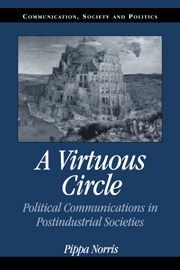Book contents
- Frontmatter
- Contents
- List of Tables
- List of Figures
- Preface
- PART I THE NEWS MEDIA AND CIVIC MALAISE
- PART II TRENDS IN POLITICAL COMMUNICATIONS
- PART III THE IMPACT ON DEMOCRACY
- 9 Negative News, Negative Public?
- 10 Knows Little? Information and Choice
- 11 Cares Less? Cynical Media, Cynical Public?
- 12 Stays Home? Political Mobilization
- 13 American Exceptionalism?
- CONCLUSIONS
- Technical Appendix
- Notes
- Select Bibliography
- Author Index
- Subject Index
9 - Negative News, Negative Public?
Published online by Cambridge University Press: 26 February 2010
- Frontmatter
- Contents
- List of Tables
- List of Figures
- Preface
- PART I THE NEWS MEDIA AND CIVIC MALAISE
- PART II TRENDS IN POLITICAL COMMUNICATIONS
- PART III THE IMPACT ON DEMOCRACY
- 9 Negative News, Negative Public?
- 10 Knows Little? Information and Choice
- 11 Cares Less? Cynical Media, Cynical Public?
- 12 Stays Home? Political Mobilization
- 13 American Exceptionalism?
- CONCLUSIONS
- Technical Appendix
- Notes
- Select Bibliography
- Author Index
- Subject Index
Summary
Earlier chapters have focused on major changes in the processes of political communication within the news media and parties. Theories of media malaise emphasize that modern developments have transformed the content of news, with the growth of ‘infotainment’, ‘negative’ news, and ‘tabloidization’, contributing towards widespread cynicism about government and political leaders. To examine these claims, we need systematic evidence about the content of news coverage and the public's responses. We are concerned here with public attitudes, understood as political preferences towards the major policy issues facing the polity, as distinct from levels of knowledge and information, which will be dealt with in subsequent chapters. This chapter assumes that three interrelated conditions must be met if the news media are to have an impact sufficient to change public attitudes at the aggregate level:
(1) The news media need to provide reasonably extensive coverage of each issue.
(2) The coverage that is provided needs to display a consistent directional bias.
(3) The public needs to be attentive to news cues, as compared with other types of information, such as those provided by parties, political leaders, specialist consultants, social and political groups, interpersonal communications, objective conditions, and personal experiences.
The reasoning is that if news coverage of an issue proves fleeting and ephemeral, then in a complex world of rapidly changing information this is unlikely to have much impact on public awareness. So quickly do events follow one another that impressions of one event will be swept away by the next, leaving no residue in a world of flux.
- Type
- Chapter
- Information
- A Virtuous CirclePolitical Communications in Postindustrial Societies, pp. 183 - 207Publisher: Cambridge University PressPrint publication year: 2000
- 1
- Cited by



